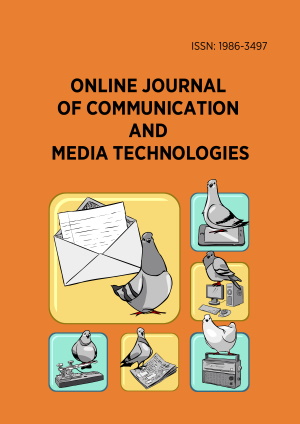Research Article
Coronavirus (COVID-19) and Online Learning in Higher Institutions of Education: A Survey of the Perceptions of Ghanaian International Students in China
More Detail
1 Institute of Communication Studies, Communication University of China, Beijing, CHINA* Corresponding Author
Online Journal of Communication and Media Technologies, 10(3), July 2020, e202018, https://doi.org/10.29333/ojcmt/8286
OPEN ACCESS 29887 Views 32174 Downloads
ABSTRACT
The first quarter of 2020 is a hard time for the global community. The Coronavirus (COVID-19) pandemics swept through the world affected many aspects of human endeavour: from the decline in industrial production to the re-adjustments in the academic calendar of all educational institutions globally. Stakeholders and management of higher educational institutions have no other option but to make use of internet technology, thus online learning for the continuation of academic activities across all schools worldwide.
This paper aims at assessing whether Ghanaian international students in China are satisfied with the ‘‘ mass’’ online learning in higher educational institutions in Beijing, China.
Therefore, this study employed an online survey to investigate the level of satisfaction of online learning in higher educational institutions and how Ghanaian international students are coping with these ‘‘new initiatives’’.
The findings from the study suggest that the implementation of online learning programs was a very great idea as the majority of the sampled students supported the initiative. The study also revealed that students have adequate knowledge of the COVID-19 pandemic. Another finding that came up during the research is the high cost of participating in online learning. However, our results showed that students outside China due to the COVID-19 spend so much money to buy internet data for online learning. Last but not least, the study discovered that internet connectivity was very slow for students leaving within the dormitories of various universities in China.
The findings from this study will be of much benefit to university administrators and management in taking future emergency decisions concerning the implementation of online learning programs for student’s different backgrounds.
This paper aims at assessing whether Ghanaian international students in China are satisfied with the ‘‘ mass’’ online learning in higher educational institutions in Beijing, China.
Therefore, this study employed an online survey to investigate the level of satisfaction of online learning in higher educational institutions and how Ghanaian international students are coping with these ‘‘new initiatives’’.
The findings from the study suggest that the implementation of online learning programs was a very great idea as the majority of the sampled students supported the initiative. The study also revealed that students have adequate knowledge of the COVID-19 pandemic. Another finding that came up during the research is the high cost of participating in online learning. However, our results showed that students outside China due to the COVID-19 spend so much money to buy internet data for online learning. Last but not least, the study discovered that internet connectivity was very slow for students leaving within the dormitories of various universities in China.
The findings from this study will be of much benefit to university administrators and management in taking future emergency decisions concerning the implementation of online learning programs for student’s different backgrounds.
CITATION (APA)
Demuyakor, J. (2020). Coronavirus (COVID-19) and Online Learning in Higher Institutions of Education: A Survey of the Perceptions of Ghanaian International Students in China. Online Journal of Communication and Media Technologies, 10(3), e202018. https://doi.org/10.29333/ojcmt/8286
REFERENCES
- Ananga P., & Biney, I. K. (2017). Comparing face-to-face and online teaching comparing face - to - face and online teaching. MIER Journal of Educational Studies, Trends & Practices, 7(2), 165-179.
- Babchuk, W. A. (2017). Book review: Qualitative research: a guide to design and implementation (4th ed.), by s. B. Merriam and e. J. Tisdell. Adult Education Quarterly, 67(1), 71-73. https://doi.org/10.1177/0741713616671930
- Bao, W. (2020). COVID ‐19 and online teaching in higher education: A case study of Peking University. Human Behavior and Emerging Technologies, 2(2), 113-115. https://doi.org/10.1002/hbe2.191
- Creswell, J. W., & Poth, C. N. (2016). Qualitative inquiry & research design: Choosing among five approaches. (4th ed). SAGE Publications.
- Donitsa-Schmidt, S., & Topaz, B. (2018). Massive open online courses as a knowledge base for teachers. Journal of Education for Teaching, 44(5), 608-620. https://doi.org/10.1080/02607476.2018.1516350
- Filius, R. M., Kleijn, R. A. M., Uijl, S. G., Prins, F. J., Rijen, H. V. M., & Grobbee, D. E. (2019). Audio peer feedback to promote deep learning in online education. Journal of Computer Assisted Learning, 35(5), 607-619. https://doi.org/10.1111/jcal.12363
- Garcia, C., & Badia, A. (2017). Information problem-solving skills in small virtual groups and learning outcomes: IPS skills and learning outcomes. Journal of Computer Assisted Learning, 33(4), 382-392. https://doi.org/10.1111/jcal.12187
- Harasim, L. M. (2017). Learning theory and online technologies. https://ebookcentral.proquest.com/lib/ulaval/detail.action?docID=4865772
- Murphy, M. P. A. (2020). COVID-19 and emergency eLearning: Consequences of the securitization of higher education for post-pandemic pedagogy. Contemporary Security Policy, 1-14. https://doi.org/10.1080/13523260.2020.1761749
- Picciano, A. G. (2017). Theories and frameworks for online education: Seeking an integrated model. Online Learning Journal, 21(3). https://doi.org/10.24059/olj.v21i3.1225
- Shlossberg, P., & Cunningham, C. (2016). Diversity, instructional research, and online education. Communication Education, 65(2), 229-232. https://doi.org/10.1080/03634523.2015.1098713
- Toepoel, V. (2017). Online survey design. In The SAGE Handbook of Online Research Methods (pp. 184-202). SAGE Publications Ltd. https://doi.org/10.4135/9781473957992
- UNESCO. (2020, Match 13). COVID‐19 educational disruption and response. Retrieved from https://en.unesco.org/covid19/educationresponse
- UNESCO. (2020). Global Education Coalition-290-million students out school due-COVID-19. In Unesco. https://en.unesco.org/news/290-million-students-out-school-due-covid-19-unesco-releases-first-global-numbers-and-mobilizes
- Wang, H., Pi, Z., & Hu, W. (2019). The instructor’s gaze guidance in video lectures improves learning. Journal of Computer Assisted Learning, 35(1), 42-50. https://doi.org/10.1111/jcal.12309
- WHO. (2020). Report of the WHO-China Joint Mission on Coronavirus Disease 2019 (COVID-19). The WHO-China Joint Mission on Coronavirus Disease 2019, February, 16-24. Retrieved from https://www.who.int/docs/default-source/coronaviruse/who-china-joint-mission-on-COVID-19-final-report.pdf
- Yang, F., & Li, F. W. B. (2018). Study on student performance estimation, student progress analysis, and student potential prediction based on data mining. Computers & Education, 123, 97-108. https://doi.org/10.1016/j.compedu.2018.04.006

 The articles published in this journal are licensed under the CC-BY Creative Commons Attribution International License.
The articles published in this journal are licensed under the CC-BY Creative Commons Attribution International License.